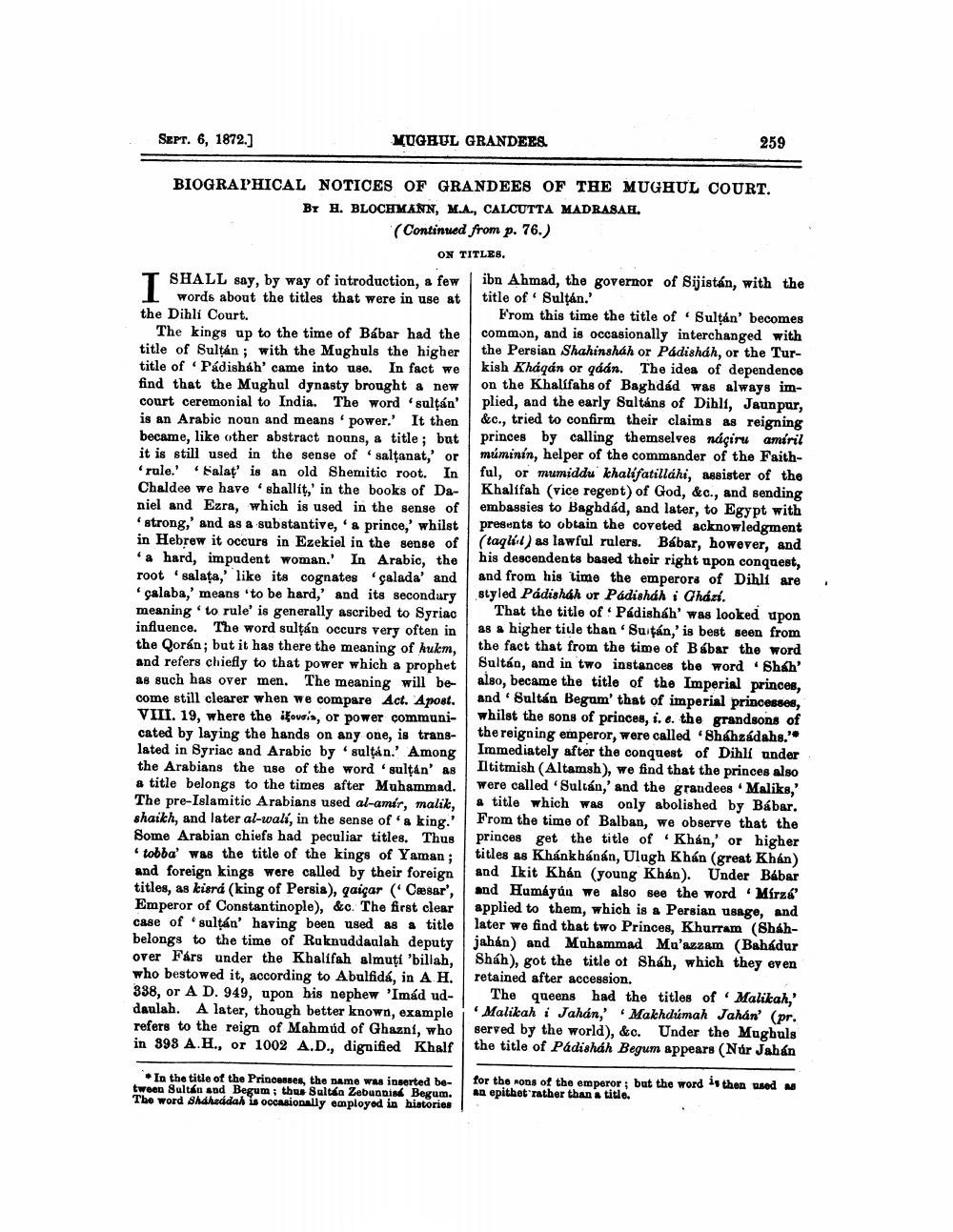________________
SEPT. 6, 1872.]
MUGHUL GRANDEES.
BIOGRAPHICAL NOTICES OF GRANDEES OF THE MUGHUL COURT. BY H. BLOCHMANN, M.A., CALCUTTA MADRASAH. (Continued from p. 76.)
ON TITLES.
I introduction, a
words about the titles that were in use at the Dihlí Court.
259
In the title of the Princesses, the name was inserted between Sultan and Begum; thus Sultán Zebunnisé Begum. The word Shaheddah is occasionally employed in histories
ibn Ahmad, the governor of Sijistán, with the title of Sultán.'
From this time the title of Sultán' becomes common, and is occasionally interchanged with the Persian Shahinsháh or Pádisháh, or the Turkish Kháqán or qáán. The idea of dependence on the Khalifahs of Baghdad was always implied, and the early Sultáns of Dihlí, Jaunpur, &c., tried to confirm their claims as reigning princes by calling themselves náçiru amiril múminín, helper of the commander of the Faithful, or mumiddu khalifatilláhi, assister of the Khalifah (vice regent) of God, &c., and sending embassies to Baghdád, and later, to Egypt with presents to obtain the coveted acknowledgment (taqlid) as lawful rulers. Bábar, however, and his descendents based their right upon conquest, and from his time the emperors of Dihli are styled Pádisháh or Pádisháh i Ghází.
6
The kings up to the time of Bábar had the title of Sultán; with the Mughuls the higher title of Pádisháh' came into use. In fact we find that the Mughul dynasty brought a new court ceremonial to India. The word 'sultán' is an Arabic noun and means 'power.' It then became, like other abstract nouns, a title; but it is still used in the sense of saltanat,' or 'rule.' 'Salat' is an old Shemitic root. In Chaldee we have shallit,' in the books of Daniel and Ezra, which is used in the sense of 'strong,' and as a substantive, a prince,' whilst in Hebrew it occurs in Ezekiel in the sense of 'a hard, impudent woman.' In Arabic, the root salata, like its cognates 'çalada' and 'çalaba,' means 'to be hard,' and its secondary meaning to rule' is generally ascribed to Syriac influence. The word sultán occurs very often in the Qorán; but it has there the meaning of kukm, and refers chiefly to that power which a prophet as such has over men. The meaning will become still clearer when we compare Act. Apost. VIII. 19, where the ioveis, or power communicated by laying the hands on any one, is translated in Syriac and Arabic by sultán.' Among the Arabians the use of the word 'sultán' as a title belongs to the times after Muhammad. The pre-Islamitic Arabians used al-amir, malik, shaikh, and later al-walí, in the sense of a king.' Some Arabian chiefs had peculiar titles. Thus tobba' was the title of the kings of Yaman; and foreign kings were called by their foreign titles, as kisrá (king of Persia), gaiçar (Cæsar', Emperor of Constantinople), &c. The first clear case of sultán' having been used as a title belongs to the time of Ruknuddaulah deputy over Fárs under the Khalifah almuți 'billah, who bestowed it, according to Abulfidá, in A H. 338, or A D. 949, upon his nephew 'Imád uddaulah. A later, though better known, exampleMalikah i Jahán, Makhdúmah Jahán' (pr. refers to the reign of Mahmud of Ghazní, who in 398 A.H., or 1002 A.D., dignified Khalf
The queens had the titles of Malikah,'
served by the world), &c. Under the Mughals the title of Pádisháh Begum appears (Núr Jahán
"
That the title of Pádisháh' was looked upon as a higher title than Sután,' is best seen from the fact that from the time of Bábar the word Sultán, and in two instances the word Shah' also, became the title of the Imperial princes, and Sultán Begum' that of imperial princesses, whilst the sons of princes, i. e. the grandsons of the reigning emperor, were called 'Shahzadahs."* Immediately after the conquest of Dihli under Iltitmish (Altamsh), we find that the princes also were called 'Sultán,' and the grandees 'Maliks,' a title which was only abolished by Bábar. From the time of Balban, we observe that the princes get the title of Khán,' or higher titles as Khánkhánán, Ulugh Khán (great Khán) and Ikit Khán (young Khản). Under Bábar and Humáyún we also see the word Mirza' applied to them, which is a Persian usage, and later we find that two Princes, Khurram (Sháhjahán) and Muhammad Mu'azzam (Bahadur Shah), got the title of Shah, which they even retained after accession.
6
for the sons of the emperor; but the word is then used as an epithet rather than a title.




